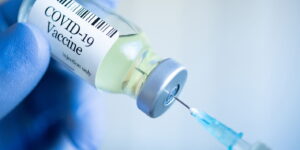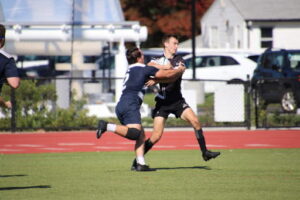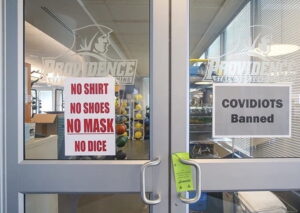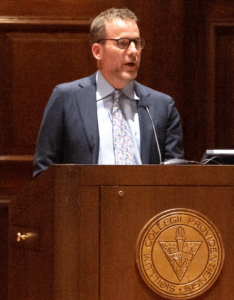Tag: Eileen Cooney ’23
Road to Recovery Hits Speed Bump: COVID Concerns Rise as PC Experiences Spike
by The Cowl Editor on February 11, 2021
Campus

by Eileen Cooney ’23
News Staff
A dip in the number of reported coronavirus cases across the country in recent days has compelled some states, including Rhode Island and Massachusetts, to ease up some restrictions. Rhode Island recently lifted its curfew for restaurants and bars, and Massachusetts announced a plan to allow restaurants and other indoor businesses to operate at higher capacity.
Additionally, Rhode Island has announced the closure of the Dunkin’ Donuts Center testing site and its transformation into a state-run vaccination site. This is part of the state’s efforts to ramp up vaccinations and to move the process along so that a majority of its population can get vaccinated.
On campus, however, the number of reported COVID-19 cases among Providence College students has remained high over the past few days. As of Feb. 3, there are 89 students in isolation and 121 students in quarantine. As of Feb. 9, PC’s positivity rate is 2.27 which is slightly below the Rhode Island state positivity rate of 2.7%. While the number of students testing positive looks higher this semester compared to last, an email from the College’s continuity task force sent out last Wednesday stressed the need to take this data seriously.
This semester, students are being tested much more frequently, and we are in an environment where the virus is much more widespread in the surrounding community.
Additionally, a number of the positive cases reported each day are from students who are already in quarantine as close contacts. Clearly, this subset of individuals is a group that has a higher probability of testing positive due to their status as close contacts, and most of these individuals had already been removed from the population by the time of their test.
Despite this relatively positive news, the College is still warning students to remain vigilant. The Office of Public Safety and Community Standards sent out an email on Feb. 6 warning students that they were aware of the reported behavior in violation of the student code of conduct that seems to be exacerbating the spread of the virus. Public Safety again warned students of the consequences of their actions. Public Safety’s concerns are certainly not unfounded—on February 8 and 9, PC reported 34 and 33 new cases, respectively.
The College also announced its plan to test students twice weekly instead of just once. The effects of this plan remain to be seen in the coming weeks.
Despite this, PC students remain resilient and determined to make the most of this rather strange semester. This winter, the College’s Office of Student Activities invested in fire pits to be placed on Slavin lawn. The fire pits seat up to six people and can be reserved for one-hour time blocks on Friday, Saturday, and Sunday nights from 4 p.m.–midnight. Students can reserve them with their pods to safely and warmly enjoy a nice meal or banter session with friends.
On Friday and Saturday nights, students can be seen gathered around the fires with masks on, grateful for the opportunity to be on this beautiful campus. Additionally, the Office of Student Activities has reserved food trucks for every weekend this semester. Last weekend featured Ming’s Asian Street Food truck. These have been a major hit among students.
Gracie Cleaver ’23 says, “I love the new food truck Fridays. They are a great and safe way to get out of your dorm and enjoy some good food with friends. I’m really happy and appreciative that the College has invested so much time, money, and thought into resources for students during this very difficult time.” Although this semester has seen an unprecedented number of changes to daily life for students, the College’s commitment to its students’ well-being remains strong. The College is working hard and will need the support of the student body to avoid the same kind of outbreak that put a pause on the fall semester.
Helping to Turn the Tide: First COVID-19 Vaccinations Flood Ocean State
by The Cowl Editor on February 4, 2021
Campus

by Eileen Cooney ’23
News Staff
On Feb. 1, Rhode Island reported a 2.7 percent COVID-19 positivity rate, its lowest since October, with 158 new cases and 13 fatalities. The decrease in the positivity rate is due to a combination of factors, but many health officials are pointing to the nearly 77,000 first doses of the vaccine that have been administered so far, and the 28,000 people in Rhode Island who have been fully vaccinated.
Rhode Island, like all states currently, is seeking to ramp up its vaccination efforts in hopes of stemming the winter surge and combatting new variants of the virus that are causing alarm.
On Jan. 28, state health officials announced the next phases of the state’s vaccination plan, which allows those who are 65 and older to be vaccinated starting in mid-February. As of now, there are only limited vaccinations available for those above the age of 75. Rhode Island first made vaccinations available to health-care workers, first responders, and nursing home and assisted living facility residents and staff.
Dr. Nicole Alexander-Scott, Rhode Island’s Department of Health director, has said that the next upcoming phase will involve all Rhode Islanders over the age of 16 who have underlying health conditions, are immunocompromised, or are pregnant. This next phase is also unique in that it would involve distributing vaccines at a quicker pace in those towns where there are a disproportionate number of hospitalizations due to the virus, Alexander-Scott has said in press conferences.
She states that, currently, the state is dealing with a limited supply of the vaccine, but that “the aims of this next phase are to protect those most at risk for hospitalizations and death from COVID-19.”
In neighboring states like Massachusetts, the vaccine roll-out has not been as well-received by residents. Massachusetts Senator Eric Lesser said on Jan. 28 that “the Phase 2 vaccine rollout is creating mass confusion and anxiety for our eligible senior population. The system is cumbersome, contradictory, and asks residents over 75 to navigate a haze of web links, locations, and instructions, each with different criteria and scheduling systems.” In response to criticism, Massachusetts Governor Charlie Baker urged all to be patient with the process until a steadier, more stable supply of doses is obtained from the federal government. The governor also said that his administration was working to create more resources to help those who are older and having difficulty trying to navigate the sign-up process.
News of increased vaccinations offers Rhode Islanders and those in neighboring states slight glimmers of hope during what has been a disastrous winter for the state and the country as a whole. New coronavirus variants that were first identified in South Africa and the United Kingdom have been found to be more contagious, and now there is preliminary evidence suggesting they could even increase mortality. On Jan. 29, Johnson & Johnson released data revealing that their one-dose vaccine is 66 percent effective against moderate and severe disease, but this hopeful measure was overshadowed by other data, suggesting the vaccine could be less effective against these new variants. Shares of Johnson & Johnson fell on Friday as investors were hoping for an efficacy number above 80 percent. In response to this pessimism among some, John Brooks, a chief medical officer at the CDC, said that “any vaccine is better than no vaccine.”
In the meantime, Providence College students find themselves going through the motions of weekly testing and social distancing measures following their return to campus for the spring semester. After observing an initial “quiet period” in which students were required to stay in their on or off-campus housing locations, with exceptions given for traveling to class and work, shopping for groceries and receiving grab-and-go meals from Raymond Dining Hall, and participating in outdoor exercise with a student’s own pod, the hope amongst many students is that recent developments on the vaccine front will help alleviate stress and restrictions on the PC community. Time will tell just how successful these recent vaccination efforts have been.
From Scranton, PA to Pennsylvania Avenue: Biden, Harris Enjoy Historic Victory
by The Cowl Editor on November 12, 2020
National and Global News

by Eileen Cooney ’23
News Staff
On Saturday, Nov. 7, after four long days of counting votes from key swing states including Arizona, Georgia, Nevada, North Carolina, and Pennsylvania, presidential candidate Joseph Biden obtained 290 electoral votes, surpassing the 270 threshold needed to take the White House.
Early Friday morning, Joe Biden took the lead in Pennsylvania, a very promising sign for the Biden campaign, as Biden sought to turn the state blue after Hillary Clinton failed to do so in the 2016 presidential election. With Biden winning Pennsylvania and leading in Georgia, President Donald Trump’s hopes at reelection were squashed—without Georgia or Pennsylvania, he could not gain enough electoral votes to win reelection.
In a speech given on Thursday, Nov. 5, President Trump indicated his intentions to preserve the integrity of the election by bringing the results to the courts, saying there would be “a tremendous amount of litigation,” and that he would not “allow anyone the ability to steal such an important election.” He also urged officials to stop counting votes, tweeting “STOP THE COUNT!”
On Nov. 6, Supreme Court Justice Samuel Alito temporarily granted a GOP request to have mail-in ballots received after Nov. 3 in Pennsylvania separated, but he did not prohibit them from being counted.
Many prominent Republican Senators publicly defended President Trump’s claims of election corruption. Senator Lindsey Graham, chair of the Senate Judiciary Committee, was one of many who said that he stands with President Trump. Similarly, Senator Ted Cruz has also affirmed his support for President Trump, voicing his opinion that the Justice Department, state legislatures, and the Supreme Court should get involved to make sure that voting laws have been followed properly. Others, notably Senate Majority Leader Mitch McConnell, have remained largely mute on the subject, with McConnell only tweeting, “Every legal vote should be counted.”
While it was largely expected that a winner would not be determined on election night due to the COVID-19 pandemic and the surge in absentee voting, Democratic leaders and the Biden campaign were not expecting President Trump to declare victory prematurely.
On election night, Trump gave what seemed to be a victory speech, where he claimed victory in Georgia and North Carolina, even though ballots were still being counted. He also contested the results in Arizona, calling upon officials to overturn their decision to give Biden those electoral college votes at the time.
In the days following election night and the pronouncement of Joe Biden as the winner, President Trump has vehemently attacked the integrity of the election, claiming that “if you count the legal votes, I easily win,” and calling mail-in voting “a corrupt system.” He has accused Democrats of trying to steal the election from him, claiming that the voting apparatus of those states key swing “are run in all cases by Democrats.”
This statement is false, as in the key states of Georgia and Nevada, the top elections officials, Secretary Brad Raffensperger and Secretary of State Barbara Cegavske, respectively, are both Republicans. Again, President Trump and his campaign team have publicly announced their intentions to pursue legal action to ensure that all election laws were followed.
Meanwhile, the Biden campaign remains confident in the results of the election, with Joe Biden giving a victory speech that focused on his administration’s next steps and attempted to bridge the divide between Biden and Trump supporters. Biden said, “For all those of you who voted for President Trump, I understand the disappointment tonight. I’ve lost a couple of times myself. But now, let’s give each other a chance.”
Biden also announced on social media, “I am humbled by the trust and confidence you have placed in Kamala Harris and I. We’re reminded tonight of all those who fought so hard for so many years to make this happen. It is long overdue, but once again, America has bent the arc of the moral universe towards justice.” This election will certainly be one for the history books, as Mr. Biden received the most votes ever cast for a U.S. president and Ms. Harris became the first woman, first Black American, and first South Asian American to be elected to the office of vice president.
COVID-19 Concerns Rise in Rhode Island: Gov. Raimondo Warns Against Loosening Up on State Regulations
by Kyle Burgess on October 29, 2020
National and Global News
By: Eileen Cooney ‘23
News Staff
Reported COVID-19 cases in Rhode Island, and specifically in the Providence area, are on the rise. On Oct. 21, the Rhode Island Department of Health reported 470 new cases of the virus, topping the single-day record set back in April during the peak of the virus, and putting the seven-day positivity rate at 2.0%, the highest it has been in months.
The increase in cases have sparked a growing concern among health officials, politicians, and citizens about the fears of the dreaded “second-wave” that has already begun in Europe. Governor Gina Raimondo, in her press conference given on Oct. 21, said that Rhode Island is not at the threshold of a second wave just yet, but that the trends in the data certainly indicate that the state is headed in that direction.
She urged citizens to think of their fellow Rhode Islanders, and to follow mask-wearing and social distancing protocols so that everybody can get back to work and back to their lives sooner. “We are not in a good place,” she said, emphasizing that people’s actions can again control and flatten the curve.
Her pleas to the general public come in the wake of backlash to her announcement last week that Rhode Island would stay in Phase 3 until there is a widely available vaccine. In Phase 3, the indoor and outdoor gathering limit is 15 people, mask-wearing is mandated, and proper social distancing protocols must be followed. Many small-business owners said this is a blow to their already barely surviving businesses. In response, Raimondo says that she would like to incrementally relax restrictions, but the recent exponential surge in cases prevents her from doing so immediately.
There has also been concern about whether schools are going to become breeding grounds for the virus and if they will further perpetuate spread across communities. William M. Davies, Jr. Career and Technical High School in Lincoln, RI recently released a report with evidence that could indicate community spread at the high school.
Raimondo has said that there is still clear evidence that schools are not a significant source for community transmission, and she says that the risks of not having kids in school are far worse because schools provide essential services, such as meal support and mental health counseling, to many kids who would otherwise not receive them. Raimondo says the effects of children not receiving these services has been and will continue to be extremely detrimental if schools were to close.
With the holidays approaching, Raimondo has voiced her concerns about an even more drastic rise in cases. She is worried about Halloween, Thanksgiving, and Christmas all occurring in close succession. Raimondo says she understands that people feel isolated and are tired of living with the virus, but she asked them to think about others before not abiding by state regulations concerning COVID-19.
Rhode Island is not alone in dealing with this new surge of cases, as the United States reported a record-number of new coronavirus cases on Oct. 23, and six states topped daily death records. Many leading health officials have said that all of this data indicates that the U.S. is headed for a dark winter.

PC Dads in Politics Speak on Upcoming Election: College Hosts Chris Christie ’23P and Michael Dukakis ’23GP
by The Cowl Editor on October 15, 2020
Campus

by Eileen Cooney ’23
News Staff
On Thursday, Oct. 1, Providence College hosted a Friar Forum with two former governors and presidential candidates, Chris Christie ’23P and Michael Dukakis ’23GP. Christie and Dukakis answered questions about the upcoming election and shared stories about their careers in public service.
The event, moderated by political science department chair Dr. Joseph Cammarano and senior political science major Julia Murphy ’21, was extremely popular with over 700 students, parents, faculty, and alumni in attendance.
Murphy opened the forum by asking the two former governors, “What drew you to public service, and what made you stay so long?” Both Christie and Dukakis answered with detailed, personal anecdotes about their early childhood and adolescence.
Dukakis, growing up in Brookline, MA at a time when people of color were barred from living in his neighborhood, listened to the CBS World News Roundup every night on the radio, and grew interested in solving the injustices he observed in his immediate surroundings. He says that he never regretted his decision to serve in the public sector, and he emphatically claimed, “to be able to make a difference in the lives of your fellow citizens, there is nothing like it.”
Similar to Dukakis, Christie said his interest in public service came at a young age. He told stories of being six years old and watching the Democratic National Convention with his grandmother and of being a teenager volunteering on Tom Kean’s 1977 campaign for the Republican nomination for the governor of New Jersey.
Dukakis and Christie, who both have extensive experience in bridging partisan division, were asked how current political leaders can work effectively with opposing ideas or individuals.
Christie stressed the importance of generating strong personal relationships with others above all else. He feels that the largest problem in Washington, D.C. today is the lack of interaction between politicians; they do not engage with one another long enough to foster personal trust. “It’s much harder to hate up close,” he says. That is why personal relationships make all the difference. Similarly, Dukakis emphasized the importance of inviting leaders on both sides to work together to solve problems and develop policy.
While bipartisanship is surely a big issue, so is the lack of democratic participation among young people. Thus, Murphy asked Christie and Dukakis what passionate young people should do to get involved.
Both responded by emphasizing that we have a political system that allows for people of all backgrounds to come forward and speak their minds. They highlighted the importance of young millennials and Generation Z kids just showing up, displaying their talent, and working hard to make their voices heard.
In addition to questions asked by the moderators, Dukakis and Christie also answered questions from the audience about the current executive administration’s COVID-19 response, the recent nomination of a Supreme Court Justice, and how one can ensure that our democratic institutions are not weakened.
Murphy says that “co-moderating the Friar Forum was a great experience, as it was really remarkable to see Governor Dukakis and Governor Christie, who fall on opposite sides of the political aisle, come together to share stories and insight about the importance of public service.” Coming away from the event, Murphy says that she hopes “people watching saw this as an example of how we can work together despite our differences and to take the time to get to know people we do not always agree with.”
Featured Friar Sebastian D’Ambrosio ’21: Tackling COVID through Team Effort
by Kyle Burgess on September 17, 2020
Campus
by Eileen Cooney ’23
News Staff
This week, the Featured Friar spotlight shines upon Sebastian D’Ambrosio 21.
D’Ambrosio, a Redondo Beach, CA native and a senior quantitative economics major with minors in mathematics and theology, is president of the Providence College Men’s Club Rugby Team. The team competes in the Rugby Northeast Conference and is formally recognized by both the New England Rugby Football Union and USA Rugby. It has a reputation as being one of the premier collegiate club rugby programs in the greater New England area.
Due to the COVID-19 pandemic, the team has not been able to practice formally together, nor have they been able to compete in any collegiate games. As is clearly evident, the COVID-19 pandemic has forced almost every club or organization to change its usual methods in order to adapt to the necessary social distancing protocols. Finding ways to adjust becomes especially difficult within the context of sports, and particularly rugby, which is a high contact sport.
Despite these challenges, D’Ambrosio has maintained a commitment to keeping the club rugby team up and running. He says, “As a team, we have been working tirelessly with Chris Schmidt, the head of club sports, to ensure that we develop a plan to reinstate practices in a way that is both safe and sustainable.”
The key words here are “safe and sustainable,” as the College does not want to bring back club sports prematurely only to have to shut them down again if there is a spike in COVID-19 cases. Thus, the return of club sports will involve a careful balance of precision and accuracy in order to ensure that it can be done effectively.
In order to do this, D’Ambrosio says they have been trying to work out a plan with the College that could allow for non-contact skills training and conditioning in the hopes of doing an inner club rugby competition. While he acknowledges that this will not be the same as competing against other schools, he says that it could still help the team improve their game by challenging one another.
While one might think that this lull period would lead to laziness and complacency amongst team members, D’Ambrosio says that this challenge has only further motivated his team. He says, “Until a plan is put in place, many of our players are taking it upon themselves to continue prepping for the spring,” when he anticipates club sports may be able to return under more normal circumstances.
Additionally, he said the team has been communicating via group chats to keep the team spirit up, and “there is a lot of momentum and motivation towards off-seasoning training.” This intense commitment, even in the face of adversity, is a testament to the spirit of D’Ambrosio and the PC club rugby team.
D’Ambrosio says that the hardest part about these circumstances is not being able to practice out on the field with the rest of the team, as his ultimate goal is to keep the legacy of the PC rugby team alive. When asked about the future of PC club sports, D’Ambrosio advised other club team presidents to do whatever possible to keep the team morale high and look ahead. “Don’t get caught up in what you can’t do; look at what you can do to push your team forward.”
Another challenge with club sports amidst the pandemic is not being able to recruit new players as effectively. Though the team is currently not practicing together, D’Ambrosio says that PC club rugby has no cuts or tryouts, and he encourages any prospective students to reach out to him about what they can do to prepare if they want to join the team when play resumes.
While it is hard to say that a team can grow stronger when they cannot practice together, D’Ambrosio says that this experience will “in the long run create a greater understanding of the importance of practice and off-season training.” When he and his teammates do return to the field, D’Ambrosio expects that the PC club rugby team will continue to shine and carry on its legacy.

Ahead of the Curve: PC’s Return a Success
by Kyle Burgess on September 3, 2020
Campus
by Eileen Cooney ’23
News Co-Editor
With COVID-19 cases still surging across various parts of the United States and colleges plowing ahead with their fall reopening plans, many students and parents rightfully have trepidations about the Providence College campus reopening. Within just one week of reopning, the University of North Carolina at Chapel Hill cancelled in-person classes and switched to remote learning for the rest of the semester following an explosion of cases and a 31% positivity rate linked primarily to large off-campus gatherings. Similarly, the University of Notre Dame was forced to cancel all in-person classes for two weeks after they reached a peak positivity rate of 22.2%. The data and statistics coming from other universities have undoubtedly left PC students worried about the upcoming semester.
If there is any consolation to those returning to PC’s campus, it seems to be the robust testing policy the College has implemented in hopes of preventing large outbreaks that have been seen at other colleges across the country. Per the emails sent out by administration, students have been required to receive a point-of-origin test with a negative result three to five days before moving onto campus, and to be tested again upon their arrival to campus.
Many students have voiced their concerns about these protocols, as testing across the United States is not as rapid as many have claimed it to be, particularly in the New York, New Jersey, and Connecticut areas. While testing is available at some CVS pharmacy locations, it can take six to 10 days for results to come back for students living in these states. Katherine Cleary ’23, a resident of Rochester, New York said, “Getting an appointment for a test was very easy, but I was stressed out about getting the results back in time. Though Providence is offering testing on campus for students before they move in, this was not an option for me as I live over six hours away.”
Despite the challenges many are facing getting tested off-campus, a lot of students are praising the College’s on-campus testing system. Matthew Petry ’21 said, “getting tested was such a simple, streamlined process. It was no hassle at all.” Similarly, Tara Cooney ’21 also said, “the on-campus testing was as simple and easy as could be.”
Despite this, Cooney also voiced her concerns about the College’s quarantining protocols, particularly for students living off-campus. She said, “the school has been very clear about cracking down on off campus gatherings and the emphasis on tests, yet I don’t understand the actual logistics of what happens when someone in an off-campus house gets COVID-19. Are we allowed to use the quarantine facilities on campus or is it up to us to find accommodations? If it is up to us, what are the best practices? I think it would be helpful if the school came out with a document clearly laying out the best practices, so there is no ambiguity about what students can do and what they can’t do. It would really take away a lot of stress and pressure students are experiencing.”
According to the College’s testing dashboard, the percentage of positive cases hovers below 1%, which is comparable to the state of Rhode Island’s overall positivity rate. However, it remains to be seen whether and when a larger outbreak could occur. In the meantime, students in Friartown remain hopeful that they will be able to stay on campus until Thanksgiving.

Using Science “For Good” Measure: PC Staff Develops New Hand Cream
by The Cowl Editor on March 5, 2020
Campus

by Eileen Cooney ’23
Assistant News Editor
The For Good hand cream project started a year and a half ago as a vision for a business project in an MBA class taught by Dr. Helen M. Caldwell, assistant professor of marketing, here at Providence College.
Fr. Nicanor Austriaco, O.P., and Dr. Robert J. Camp teamed up to design the product after Rev. Nicanor Austriaco, O.P., read about an extract from the Tiberian root that has anti-aging properties. They developed a plan to create a hand cream after presenting it to their professor, Dr. Caldwell; Campbell loved it.
Since last October they have been developing the cream, and now they are in the marketing phase.
Originally, the hand cream was going to be called “forever,” but unfortunately that name was already taken. Last year, the project was adopted in an MBA marketing class by a group of students to be used as the focus of their semester project. The students named the hand cream For Good and Fr. Nicanor and his partner Dr. Camp went for it.
The hand cream is created in a little “kitchen” laboratory in the basement of Albertus Magnus Hall. It is a room that was used by construction workers when the new science building was being built, but Fr. Nicanor and his team of students now rent the space from the College for $1 a year. Here is where all the action takes place.
Students working in the lab help Fr. Nicanor, and for their services they get paid minimum wage. After the cream has been concocted in the lab, part of the students’ duties involve filling the plastic tubes, printing out labels, and applying the labels. The students involved in the project will also get an opportunity to be a part of the expansion of the For Good body products. Fr. Nicanor said a body butter and a serum are in the works for the future.
Additionally, Fr. Nicanor is searching for new student employees who would be willing to work on the project for minimum wage, specifically an English major who would be able to write a market campaign and a graphic designer who would be able help with art and design. Anyone interested is encouraged to contact him.
The goal of this project, says Fr. Nicanor, is to “set up a business labs experience for students interested in entrepreneurship in the same way that we have science lab for science majors.”
Currently, the hand cream is available for sale in the bookstore and on the bookstore’s website. Ten percent of the proceeds from sales of the hand cream are used to fund Fr. Nicanor’s student run lab that researches genes involved in skin cancer. In this way, a portion of the proceeds from the hand cream are going to be indirectly funding skin cancer research.
Fr. Nicanor also encourages all PC students to keep up with the For Good project on Instagram. Every day they will be posting pictures of the hand cream at different locations around campus, and there will be chances for students to enter contests to win free products. Additionally, pop-up shops in Slavin, Harkins, and the Ryan Center, will be coming soon so that students can try the product and purchase it.
Welcome to the 21st Century: Technology’s Place in PC Classrooms
by The Cowl Editor on February 27, 2020
Campus
by Eileen Cooney ’23
Assistant News Editor
Although it is not a universal policy that computers and other devices are not allowed to be used during Development of Western Civilization classes, most of the professors who teach the course implement policies that bar technology from being used for learning purposes.
The prohibition of technology in the classroom can be difficult for students who prefer to type notes on a tablet or a computer rather than handwrite them, or to ensure that the important points of a fast-paced lecture are written down.
Additionally, many students find it helpful to transfer their notes to a digital PDF study guide that is easy to review before exams. A typed outline of one’s notes can be more concise and clear to study from rather than a messy, unorganized, handwritten notebook.
Despite the obvious benefits of being able to use a laptop or tablet to take notes, these devices have nonetheless been barred from use in most DWC classes due to their distracting nature.
Dr. Stephen Lynch, professor of English and head of the Liberal Arts Honors program, says that he does not allow technology to be utilized in his classes because “if a student receives an email or some other notification it is just too tempting for them to go off task and check it.”
Additionally, he cited various studies that demonstrate that students retain information better when they handwrite their notes because they are forced to be more selective in what they take down. Since they cannot write down their notes nearly as fast as they can type, a student is forced to spend more time processing the information when they write it down as opposed to when they type it.
While there have been many studies that show that information is often retained better when one physically handwrites it, there is not a general consensus. For example, some students, particularly those with poor penmanship, find it too difficult to study from their notes that have been scribbled down in futile efforts to keep up with fast-paced lectures.
Katherine Cleary ‘23 says that she would prefer to type her notes because she feels it would allow her to “be more organized” and have all her “notes in one place, not scattered across many different notebooks.” Additionally, it is worth acknowledging that we live in an increasingly digitized world where more and more schools are switching over to paperless curriculums. Many students come to college from high schools that mandate they use technology in the classroom.
Tara Cooney ‘21 says, “I came from a high school that was entirely paperless. All of my notebooks, textbooks, and powerpoints were on an iPad provided to me by my high school. Coming from this innovative way of learning to only being able to take notes the old-fashioned way was very difficult.”
Despite the increasingly digitized nature of our society, it does not seem as though the policies in DWC classes are subject to change anytime soon. Just as DWC is a long-time tradition at Providence, taking notes the old-fashioned way seems like it is going to be the norm for the foreseeable future.

Jay Willett ’20/TheCowl
Making the (Business) Leaders of Tomorrow: Humanities Forum Preps Students for Working World
by The Cowl Editor on February 6, 2020
Campus

by Eileen Cooney ’23
Assistant News Editor
On Jan. 31, Duff McDonald came to speak at the Humanities Forum about his book The Golden Passport: Harvard Business School, the Limits of Capitalism, and the Moral Failure of the MBA Elite. The title of this book comes from a New York Times article in 1978 that glorified an MBA from Harvard University as the golden passport to an upperclass life. McDonald’s entire talk refuted this claim and expounded upon the horrible consequences that have resulted from Harvard Business School’s curriculum.
McDonald began his talk by giving some background: he has a business degree from the Wharton School of Business at the University of Pennsylvania and he worked at Goldman Sachs for three years, a job that he left to pursue a career in journalism. McDonald has written three other books, including The CEO: An Interactive Book and The Firm: The Story of McKinsey and Its Secret Influence in American Business.
Until McDonald wrote his exposé of the Harvard Business School, all of the books about the institution were written by insiders or faculty members with overly positive views. Upon conducting research for the book, McDonald was shocked by how Harvard’s business curriculum was essentially immoral.
Firstly, one teaching method used at Harvard is The Case Method. This is a conversational approach that asks students to study particular cases about companies and then lead a student discussion about how one would proceed if they were the head of that company.
These first-year students are called upon randomly in class and expected to lead a 30-minute discussion after which their classmates critically evaluate it. Harvard claims that it gives students the ability to judge the parameters of a particular situation without having full knowledge—something that company management is often forced to do. McDonald claims that it teaches students, our future business leaders, to act rashly without concern for the consequences of their actions.
Secondly, Harvard Business School unleashed the Leadership Industry, claiming that it teaches its students to be the next leaders of the business world. In doing so, Harvard Business School failsto acknowledge that managers and leaders are inherently different. Leaders, McDonald argued, are naturally born and cannot be taught. On the other hand, managers are manufactured. The two should not be confused.
Thirdly, Harvard Business School pushes the idea that businesses should be run in the interest of its shareholders above all else. This has, according to McDonald, led to unethical practices by business leaders who act only in the interest of their shareholders. This shift in the curriculum, he claims, cascaded throughout the business world and left us in the place we are today. A place where inequality in America remains very high is in the business world.
When asked to comment on the book, the Dean of Harvard only released one statement about it. He said that a lot was wrong with the book; it did not acknowledge the great things the business school does. He emphasized that he read excerpts.
McDonald ended his talk by asking everyone to really think about the consequences of their actions and to always reflect upon the intentions behind their actions. He offered advice to students, saying that to be successful in the business world “you do not need to join a cult that demands complete obedience.” He also praised a liberal arts education, saying that the only classes “that are going to resonate with you 25 years from now are the liberal arts classes you took.”
